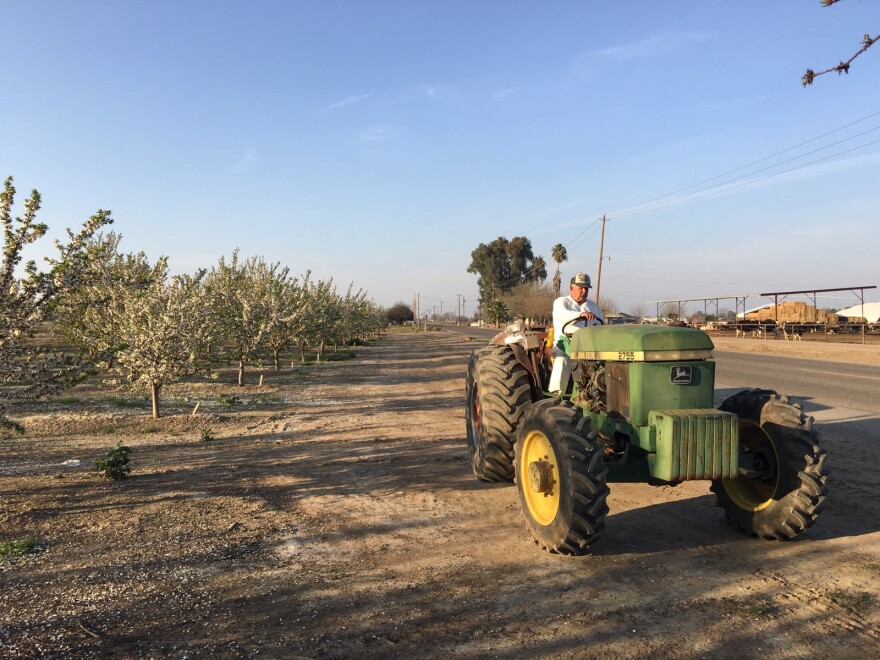Beekeepers flock from all over the country to California every February and March for bloom. During this time of year over 80 percent of the nation’s commercial bees buzz around the central part of the state pollinating almond trees. But as FM89’s Ezra David Romero reports an advancement in almond breeding could decrease the need for these bumbling insects.
Billions of honeybees are gathering nectar and pollen from almond flowers around the state to feed their colony’s young.

“Really the key is to stay calm around bees, because if you’re afraid then your body physiologically changes and they can sense that,” Hiatt says. “They literally can smell fear.”
As bees fly from flower to flower in this almond orchard at Fresno State their hairy bodies trap pollen carrying it between trees. Each flower successfully pollinated in this process will become an almond. In this orchard alone Madera Beekeeper Brian Hiatt has about 1.5 million bees.
Even though this time of year is really busy for beekeepers, Hiatt is worried that a relatively new variety of almonds called Independence could harm the longevity of his business. The almond variety is supposed to be self-fertile meaning it needs fewer or no bees to pollinate its flowers. That makes Hiatt uneasy.
“I could see us losing money, losing profits,” says Hiatt. “There are a lot of these old almonds that still need bees. That’s fine that’s job security for me. But the Independence is kind of a threat to that security.”
"We met the guy that invented them and he says there's one thing, you don't need bees and you can just plant them and go and that's why I done it." - Ben Barra

But Gene Brandi with the American Beekeeping Federation isn’t distressed over the self-fertile variety of almonds. Bees have their own issues including winter die-off and the colony collapse disorder that’s killed as much as 40 percent of the honeybees in the West.
“I don’t see it as a bad thing at all, because I know how difficult it has been for our industry to supply the bees that are needed,” Brandi says. “We’ve got an excessive number of winter losses this year around the nation. I’ve got friends that have lost 60 or 70% of their beehives.”
"We like the independence tree. We like the ease of harvest." - Josh Pitgliano
For farmers like Josh Pitgliano from Tulare County the lack of demand for bees is a win. He has several hundred acres of the self-fertile variety near Tipton. He first planted the variety six years ago.

“We like the independence tree,” Pitgliano says. “We like the ease of harvest. So this is 10 acres of Independence we have. It’s our oldest block of Independence. And I come in here once and I harvest all the nuts, all at one time.”
Traditional almond orchards have several varieties of the tree planted in each field and are harvested multiple times. With Independence, Pitgliano says there’s an added benefit. He uses less than half the amount of bees on the crop compared with the other varieties he farms.
“When these trees were young I actually worked with one of my beekeepers and we actually bee netted some trees when they were smaller,” says Pitgliano. “Without the bees working these fields it was a significant reduction in yield.”
An average hive of bees costs around $180. Most farmers place two hives per acre, but Pitgliano scrapes by with as little as half a hive per acre on his orchards of Independence. He’s noticed that this variety is shorter and more bush-like compared to its bee needing counterparts.
But the nuts it grows are just as good says 79-year-old Easton grower Ben Barra. He’s spraying his 18 acres with a fungicide to prevent disease.

When he realized he didn’t have to use bees with the Independence variety he was hooked.
“We met the guy that invented them and he says there’s one thing, you don’t need bees and you can just plant them and go and that’s why I done it,” says Barra.
Barra has farmed everything from sugar beets to eggplant to potatoes. He tore out his peaches and plums after he had a really bad season losing over $100,000.

So he latched onto the idea of a crop he’d only have to harvest once and use no bees on. So far he says the Independence variety has produced more pounds than he originally expected.
“You can’t believe it,” Barra says. “The first year we did 6,000 [pounds], and then we did 17,000 [pounds], last year we did 31,000 [pounds].”
This year he’s hopes the acreage’s yield is over 40,000 pounds, but he realizes he’s taking a chance on new nut variety that hasn’t stood the test of time.
“When I gambled with this, this was the last shot that I was making,” says Barra. “This is it. It don’t work full time, I’ll just stay in the house.”







